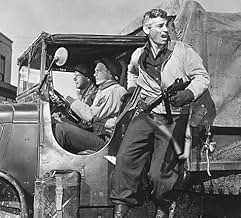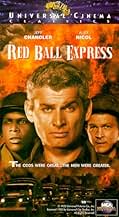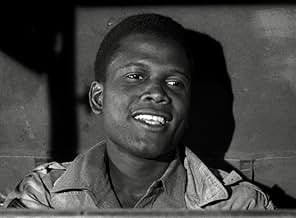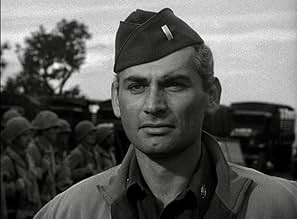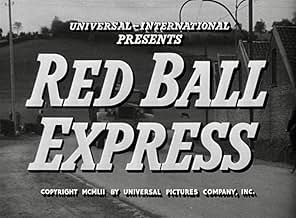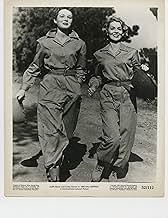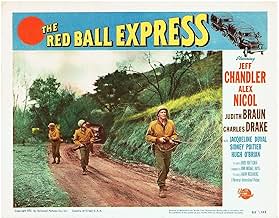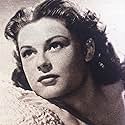NOTE IMDb
6,3/10
1 k
MA NOTE
Ajouter une intrigue dans votre langueStory of the military truck drivers who kept the Allied armies supplied in Europe during World War II.Story of the military truck drivers who kept the Allied armies supplied in Europe during World War II.Story of the military truck drivers who kept the Allied armies supplied in Europe during World War II.
- Réalisation
- Scénario
- Casting principal
Davis Roberts
- Pvt. Dave McCord
- (as Robert Davis)
Gregg Palmer
- Tank Lieutenant
- (as Palmer Lee)
Douglas Bank
- Mechanic
- (non crédité)
George Barrows
- Soldier in Bistro
- (non crédité)
Nan Boardman
- French Peasant Mother
- (non crédité)
Avis à la une
This is obviously a war film that will never be dated. Even after 60 years, it is fresh and relevant, because it tells about life the way it was in World War II, as experienced by people of the era, in a way that is credible.
We get a good mix of the "workmanship" of war, combined with "down time" and "deadly time". Chandler plays the officer who realizes how dangerous it is to be "lax", as one might be when 98% of your duty is simply workmanship, like driving, loading, and unloading supply trucks. It is the "unforeseeen" incident that gets you. It is being unready. It is the fluke or freak occurrence that will be deadly.
We have a star studded cast here, fairly common for old war films, but impossible for the twenty-first century, simply because of the dilution of movie making. Not that "dilution" is bad, but it's simply the fact that if everyone and his cousin is making a movie, then there are millions of actors, and thus no way for more than a few dozen to ever gain the sort of fame that hundreds of actors used to have.
The integration was splendid in this film, and believable. The white and black troopers behaved and spoke in a way that made you think they were from the mid twentieth century.
This is hard to do today. It is done today, but it is hard to sell that concept today. However, one must remember one thing in making World War II movies. If one makes it for the lingo of the era, as this film does, then it always remains true and credible. If one makes it for the lingo of 1990 or 2000, it will get a huge following for that generation, but in 80 years, it will be scoffed at by later generations, while films like "Red Ball Express" continue to stick around.
The acting is great, and the characters are great. Each character brings his own story to the screen, so we have many subplots. There are 3 major ones, each involving the major stars.
The subplots are handled well, and while the one with Chandler and Nicol is over the top, it is dramatic and theatrical, and well handled.
Chandler was the big star at the time. O'Brien is a minor mainstay, somehow always remaining a recognizable individual that is rare for leading man types. Poitier is a legend, with "Lillies", "Heat", "Dinner", and "Bedford" insuring his status. Drake will always remain a mainstay as a player of lovable rogues. This may be his best role, as he pretty much steals the show. Alex Nicol is the wild card. Films like this, "Then There Were Three", and "The Man From Laramie" will go back and forth to and from classic status, and he will be a huge name in classic film a hundred years from now. He probably never realized this while he was making "B" budget movies.
We get a good mix of the "workmanship" of war, combined with "down time" and "deadly time". Chandler plays the officer who realizes how dangerous it is to be "lax", as one might be when 98% of your duty is simply workmanship, like driving, loading, and unloading supply trucks. It is the "unforeseeen" incident that gets you. It is being unready. It is the fluke or freak occurrence that will be deadly.
We have a star studded cast here, fairly common for old war films, but impossible for the twenty-first century, simply because of the dilution of movie making. Not that "dilution" is bad, but it's simply the fact that if everyone and his cousin is making a movie, then there are millions of actors, and thus no way for more than a few dozen to ever gain the sort of fame that hundreds of actors used to have.
The integration was splendid in this film, and believable. The white and black troopers behaved and spoke in a way that made you think they were from the mid twentieth century.
This is hard to do today. It is done today, but it is hard to sell that concept today. However, one must remember one thing in making World War II movies. If one makes it for the lingo of the era, as this film does, then it always remains true and credible. If one makes it for the lingo of 1990 or 2000, it will get a huge following for that generation, but in 80 years, it will be scoffed at by later generations, while films like "Red Ball Express" continue to stick around.
The acting is great, and the characters are great. Each character brings his own story to the screen, so we have many subplots. There are 3 major ones, each involving the major stars.
The subplots are handled well, and while the one with Chandler and Nicol is over the top, it is dramatic and theatrical, and well handled.
Chandler was the big star at the time. O'Brien is a minor mainstay, somehow always remaining a recognizable individual that is rare for leading man types. Poitier is a legend, with "Lillies", "Heat", "Dinner", and "Bedford" insuring his status. Drake will always remain a mainstay as a player of lovable rogues. This may be his best role, as he pretty much steals the show. Alex Nicol is the wild card. Films like this, "Then There Were Three", and "The Man From Laramie" will go back and forth to and from classic status, and he will be a huge name in classic film a hundred years from now. He probably never realized this while he was making "B" budget movies.
RED BALL EXPRESS is alright I suppose . It's no masterpiece just a B war movie produced to be shown before a main feature . It involves a bunch of civilian truck drivers drafted into Uncle Sam's army in 1944 and it's those men who keep the allied front lines supplied . It's a rather predictable story of Americans fighting against Germans and where you think the most likable guy in the squad has bought the farm only for them to appear minutes later alive and well . Like I said very predictable
I guess somewhere the producers wanted to point out ( Though this would probably be known to an American audience in 1952 ) why every American war film made at the time always revolved around white American soldiers fighting . This was because the American army was segregated until 1947 and with very few exceptions black Americans didn't serve in the front lines . Despite the producers wanting to speak up fr the Black American war effort it looks painfully dated now since the blacks have lovely singing voices and sing in unison about beating Hitler which comes across as being very stereotypical and highly patronising and I doubt if a studio would be able to get away with this nowadays . Thankfully it serves to remind a wider audience in the 21st Century why war movie GIs are almost always white
I guess somewhere the producers wanted to point out ( Though this would probably be known to an American audience in 1952 ) why every American war film made at the time always revolved around white American soldiers fighting . This was because the American army was segregated until 1947 and with very few exceptions black Americans didn't serve in the front lines . Despite the producers wanting to speak up fr the Black American war effort it looks painfully dated now since the blacks have lovely singing voices and sing in unison about beating Hitler which comes across as being very stereotypical and highly patronising and I doubt if a studio would be able to get away with this nowadays . Thankfully it serves to remind a wider audience in the 21st Century why war movie GIs are almost always white
Midway through the war, the March of Time devoted time to a filmed panel discussion - quite a new idea, then - as to how the war was to be won. One comment was "This is a Quartermasters' war. Solve the issue of logistics and you've won the war".
That might have been the mission statement of this, very watchable, film
That might have been the mission statement of this, very watchable, film
This is not my favourite from Budd Boetticher, not his best either, just a common war flick, but speaking of something rather important for US Army just after D Day for logistics matters, because all the French railway nets were destroyed. It had to be told about, I guess not other film did it. That said the cast is OK, with a convincing Jeff Chandler but not as good as in MERRIL'S MARAUDERS for instance. The real Red Ball Express took many Black soldiers who could not fight in regular troops because of racial segregation in US Army during this period. Yes, this story had to be told, but I guess many things, details have been changed from reality.
10ebiros2
I'd have to say that this is a very interesting war time movie. It focuses on not the battle front, but the people who were responsible for the supply line behind the battle front.
The soldiers who are mostly rejects from the battle front are assigned to the Red Ball Express the troops comprising 6000 trucks to bring food, ammunition, and fuel.
This is an innocent looking movie, but it taught me the most important lesson of my life. That everything moves on a commerce. That war is a commerce. It's the delivery of the goods to the points of consumption that is everything. Almost nothing else matters, because if soldiers and tanks didn't have ammo and gas, there's no action. Everything in this world is the same way.
This kind of organized mobility decides the outcome of the war. America had good commander to realize this, and tactical minds to put it into action. Nobody was named a hero, but Patton couldn't have done what he did without the Red Ball Express.
This makes the movie one of the most memorable of all war time movies. I really loved it.
The soldiers who are mostly rejects from the battle front are assigned to the Red Ball Express the troops comprising 6000 trucks to bring food, ammunition, and fuel.
This is an innocent looking movie, but it taught me the most important lesson of my life. That everything moves on a commerce. That war is a commerce. It's the delivery of the goods to the points of consumption that is everything. Almost nothing else matters, because if soldiers and tanks didn't have ammo and gas, there's no action. Everything in this world is the same way.
This kind of organized mobility decides the outcome of the war. America had good commander to realize this, and tactical minds to put it into action. Nobody was named a hero, but Patton couldn't have done what he did without the Red Ball Express.
This makes the movie one of the most memorable of all war time movies. I really loved it.
Le saviez-vous
- AnecdotesLouis L'Amour's memoir, "Education of a Wandering Man", said this movie was actually based on his own war-time anecdotes. He was awarded two Bronze Star Medals while serving as an officer with the Red Ball Express.
- GaffesThe real Red Ball Express operated two separate roads for traffic (one going to the front and one for returning empty) Two-way traffic on a single road, as shown in the film , never occurred.
- Crédits fousNo credits besides the title, seven minutes in the film.
- ConnexionsFeatured in Budd Boetticher: A Man Can Do That (2005)
Meilleurs choix
Connectez-vous pour évaluer et suivre la liste de favoris afin de recevoir des recommandations personnalisées
- How long is Red Ball Express?Alimenté par Alexa
Détails
- Durée1 heure 23 minutes
- Couleur
- Rapport de forme
- 1.37 : 1
Contribuer à cette page
Suggérer une modification ou ajouter du contenu manquant

Lacune principale
By what name was Les conducteurs du diable (1952) officially released in India in English?
Répondre
